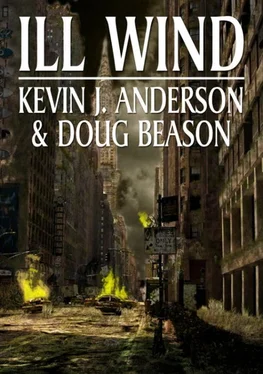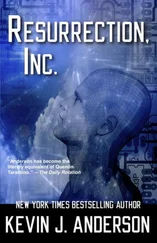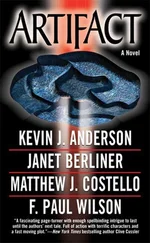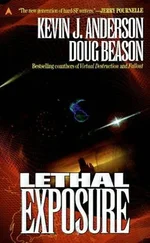Bayclock’s breathing quickened. “Sergeant? Is that your assessment as well?”
Sergeant Morris held Bayclock’s gaze. This time her voice was firm. “That’s pretty much it, sir. Except that Dr. Lockwood said that the people of Albuquerque should revolt and oust you.”
The general simmered. When he was in a fighter plane and lost control, Bayclock relied on his training: keep a cool head, run through the procedures. Losing control of himself as well as the machine he commanded would kill him for sure. The same thing was happening now on a larger scale. He focused his anger into a small, laser-bright pinpoint.
He knew his priorities. Returning electrical power to Albuquerque was the next crucial step in pulling the city out of this mess. He intended his operation to be a model for President Mayeaux’s monumental efforts to keep the country together. The U.S. needed reliable electricity to bring access to water, food, transportation, communication.
And they needed law and order. With half a million people relying on Bayclock’s effort, he knew what he had to do.
His exec stepped through the office door. He tucked his blue cap under his arm and wiped a sheen of perspiration from his sunburned forehead. “Sir, Mayor Reinski is on his way over and will be here within the hour. Do you still want to see him?”
“Later.” Bayclock dismissed his exec with a wave. His jaw tightened. “Nedermyer, what do you know about Lockwood’s operation at White Sands?”
Nedermyer looked puzzled. “Most everything, I suppose. I approved all his designs back at DOE headquarters.”
“Could you get it fully functional?”
“Why?”
“I didn’t ask you that, doctor. Are you as good as Lockwood?”
Nedermyer lifted his chin. “If I’m given the authority and the manpower, I can do it.”
“All right. I want you to shave off that beard and make yourself presentable.” He turned to Sergeant Morris. “It took you a week to get down there?”
“Yes, sir.”
On horseback , thought Bayclock. That meant about three weeks on a forced march. Could he afford it? With superior weaponry and training, an armed expedition to White Sands would require relatively few men, and the payoff would be enormous, both in the technology they would liberate and in reinforcing the general’s authority.
He spoke to his executive officer with a heavy voice. “Get Colonels David and Nachimya in here. White Sands doesn’t seem to appreciate the fact that they’re still under martial law.”
He cracked his knuckles again. “They’re about to have their assets confiscated.”
The train journey gave purpose to Todd’s life again.
Once the locomotive got up its full head of steam, Todd helped the Gambotti brothers and Rex O’Keefe toss split wood into the furnace. Dax and Roberto Gambotti hoarsely sang old songs while Rex sat behind them, supervising the stoking. Waving smoke from his eyes and sipping on a coffee cup filled with chardonnay, Rex expounded on the virtues of the wine they carried with them: merlot, cabernet, reisling. Todd had never been much of a wine drinker himself.
The big coffee-colored man who called himself Casey Jones didn’t move from the engineer’s cab, as if he had sworn to keep vigil over their journey. Covered with soot and sweating from both the work and the heat, Todd exhilarated in the constant physical effort, helping the Steam Roller chug ahead.
The tracks unreeled in front of them across California’s brown Central Valley. To their left, a low line of hills grew larger hour after hour as the valley widened, and the tracks swung east to flank the foothills of the Sierra Nevada. Every ten or twenty miles they had to stop to clear debris from the track; they pushed wood, cars, and once the carcass of a Piper Cub aircraft off the metal rails. Even out in the unpopulated areas, people came running after the train. Once they heard gunshots. Casey Jones wanted to make it the rest of the way to Los Angeles, though, and pushed on without further delays.
The locomotive’s top speed was only 30 miles per hour. The monotonous landscape crawled along, but they made progress. It felt good to be moving. Todd stripped off his shirt and tied it to a post by the locomotive’s open window. Gusts of summer air felt cool on his skin.
He preferred to work with Casey Jones, as the others were too quick to make light of their situation. It was though they used their wit to deny what had happened to the world around them.
On the first night, Todd and Casey labored in silence, trying to outdo each other in their prowess for manual labor. Todd had to chuckle as he thought of how Iris would react to their posturing: “Figures,” she would have said with scorn, “the fall of civilization, and you macho men are still competing against each other!” Sometimes he imagined her standing next to him; in his daydream they journeyed across the worled, trying to make up for the devastation they had helped to unleash upon the world.
He felt a pang from missing her, and he felt guilty as he tried to ignore it… because he was enjoying himself.
His companion was reticent, preoccupied to the point of gloominess. He seemed to wear a shroud of his own guilt. Todd tried to draw him into conversation as they stood side by side in the crowded engineer cab.
“Who are you?” Todd said. He had to shout over the roar of the furnace and the clatter of the train.
“I already told you.”
“Right. What is your real name?”
“None of your damn business!”
Todd brought more wood.
The train chugged along, hour after hour. Todd and Casey changed to working in shifts with the Gambotti brothers and Rex O’Keefe. As he rested, Casey Jones refused to engage in conversation. Todd sat in the dining car munching tomatoes and peeling the outer leaves of cabbages. Damn rabbit food , he thought. He longed for a thick cut of juicy steak, or even a McDonald’s hamburger, but he didn’t have much choice.
The train tracks led to Fresno and then Bakersfield, cities surrounded by sufficient agriculture that the population could feed themselves, though they had no great amounts of food to spare. Casey stopped the train only briefly to exchange news with the gathered crowds. Todd stood back and watched as they flocked to see the Steam Roller puff into the city, a black-and-scarlet icon of lost technology.
On the second day, a spur of the Southern Pacific railroad hooked west from Bakersfield, taking them toward the Los Angeles metropolis. Casey slowed, allowing Todd and Roberto Gambotti to drop to the ground and run ahead to strain at the lever that switched the track. At first Todd was afraid the switch was frozen, but after laying into the mechanism, the two men slowly muscled the track section about.
Though the boxcars were piled high with fruits and vegetables, Todd didn’t know what that amount of food would do for LA. How many millions of people lived in the huge dying city? But Casey insisted they continue, fixated. Todd didn’t try to talk him out of it. He just wanted to get to JPL.
The men rotated duty during the night. The train moved through the darkness with a hypnotic, monotonous clacking. Twice they hit something on the track, but both times it was too small to even slow their pace.
In darkness, Todd stood by the closed door of the roaring boiler. He could feel waves of heat mixed with counterpoints of cool air gusting through the windows. The moon hung overhead, shining down like a milky spotlight illuminating the silvery tracks ahead.
Exhausted from the day’s labor, Todd wrapped his knuckles around the open window. He stared into the oncoming night, and thought of Iris.
* * *
Steam Roller chugged westward, belching steam as it approached the hills around Los Angeles.
Читать дальше












